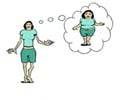Anorexia websites and support groups seem to be proliferating on the worldwide web, that is a disturbing trend, warn experts.
Anorexia websites and support groups seem to be proliferating on the worldwide web, that is a disturbing trend, warn experts. But they can be countered too.
Pro-ana websites, promoting anorexia nervosa, and pro-mias, encouraging bulimia, feature photographs and videos of extremely skinny women and girls and tips for crash dieting, fasting and forced vomiting.There is a much-noticed video that shows images of rail-thin celebrities while a song plays in the background: "Lie awake in bed at night/ And think about your life/ Do you want to be different?" This is one of the dozens of videos that pop up if you search the term "pro-ana" in YouTube.
Dr. Rebecka Peebles of Stanford University, studying the ana and mia sites, says eating disorders often cause feelings of isolation and depression. Many people suffering from anorexia or bulimia go to these Web sites because they are looking for emotional support, but it is difficult to scientifically measure their effects.
"What we don't know is who of these Web site users are most vulnerable to the risk messages ... inherent in the Web sites," Peebles told NPR, a well-known alternative radio channel in the US.
And here comes along an initiative to fight such disturbing trends, from a woman who herself had been hooked on anorexic practices for long but who could check herself on the edge of the precipice, as it were.
Melissa Cox first heard about pro-ana Web sites while her mother was watching Oprah.
At the time, she was a teenager struggling with anorexia. At one point, the 5-foot-7-inch Cox weighed a mere 78 pounds.
Part of that process was starting a Web site, Ana Death, to help anorexic sufferers recover. Cox's site mimics the style of "thinspiration" sites — where people who choose to be anorexic post tips on controlling eating — to communicate her healthy message.
Cox has posted pictures of herself when she was incredibly thin. She says she worries at times that they might motivate visitors to starve themselves. But she also includes accounts of how physically devastating her eating disorder was to demonstrate how dangerous anorexia can be. "All I can do is put my experience out there," Cox says, "and hope it's being helpful."
There are similar sites beginning to make an impact. But it could be a long haul.
Source-Medindia
GPL/L
 MEDINDIA
MEDINDIA

 Email
Email





